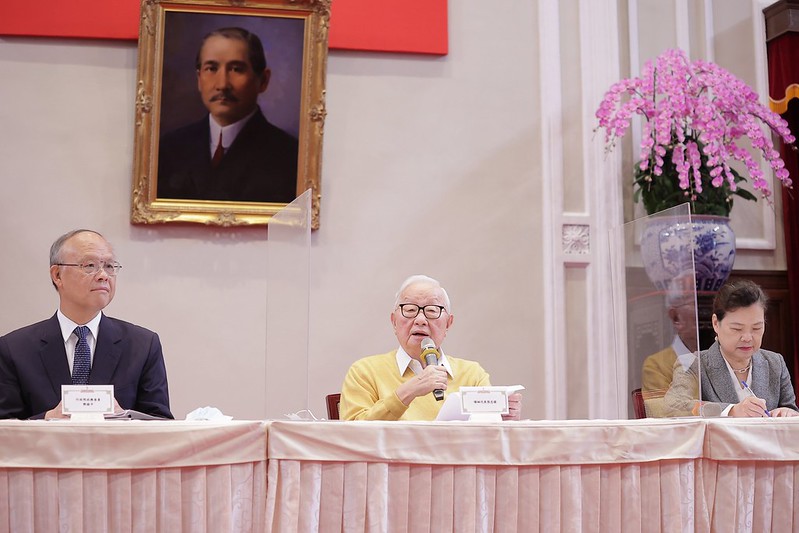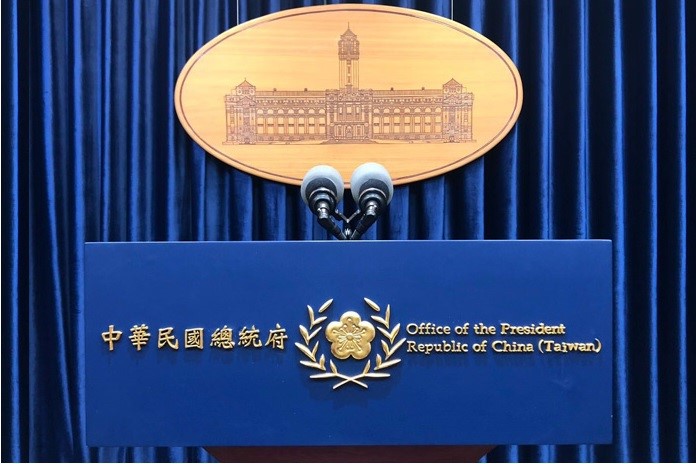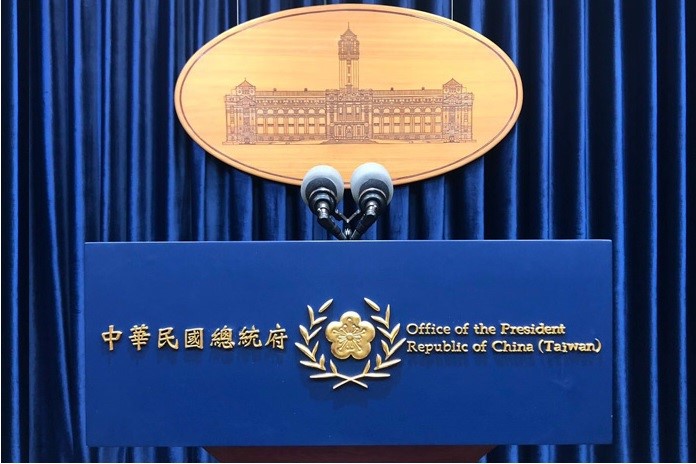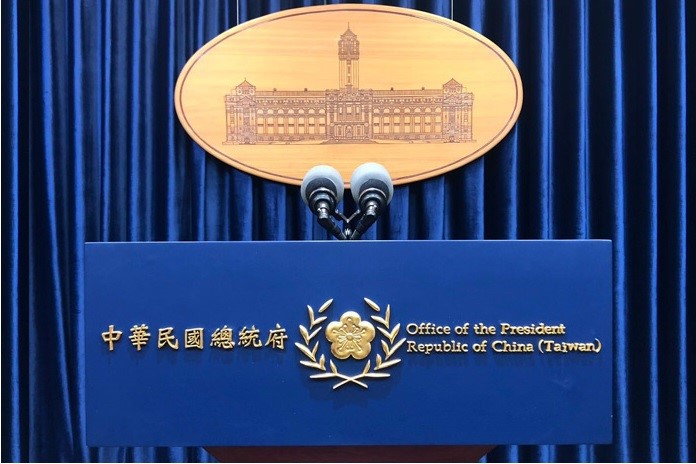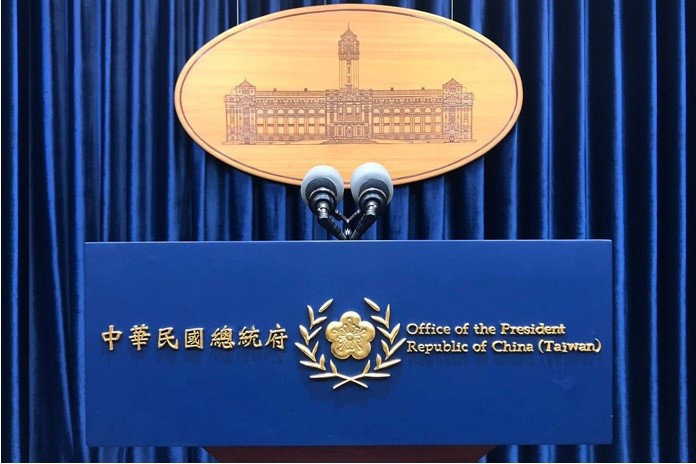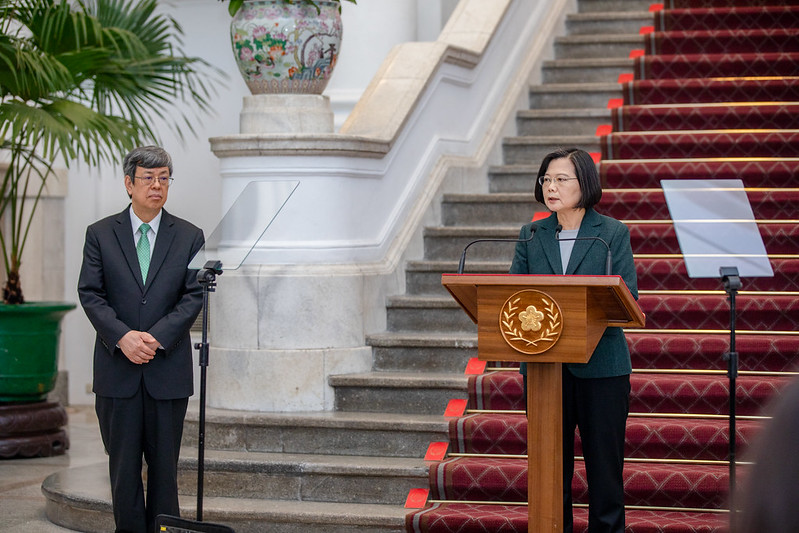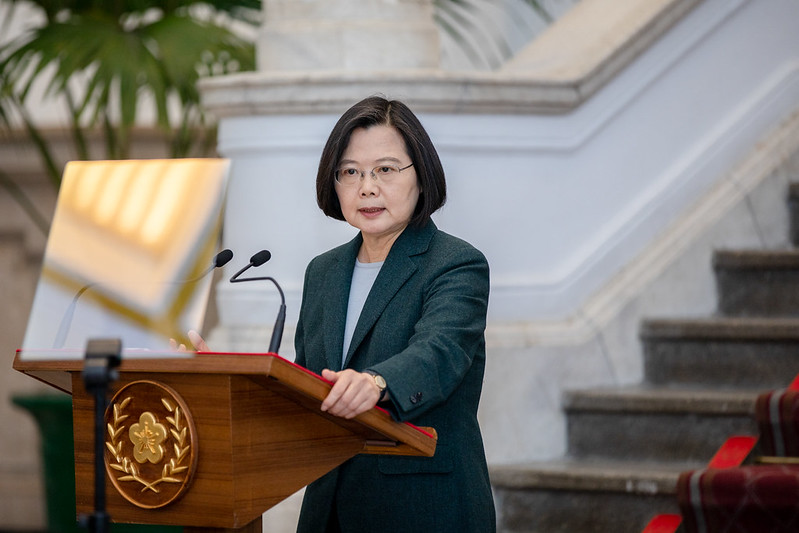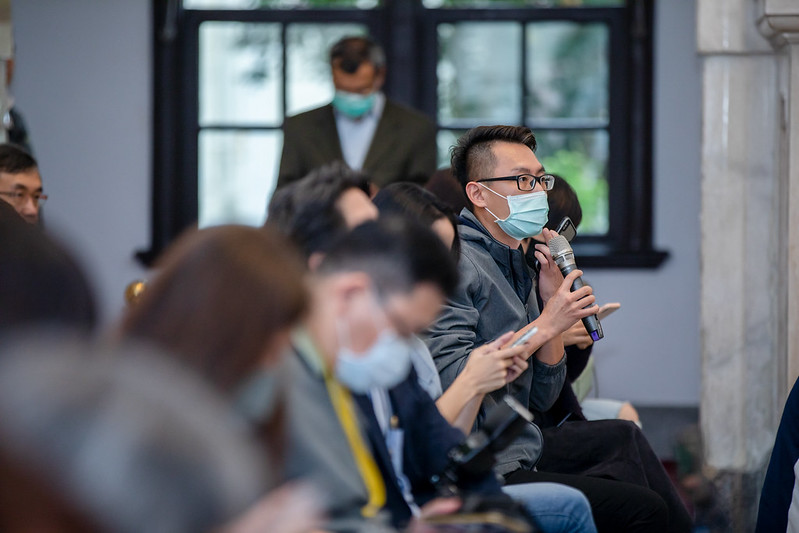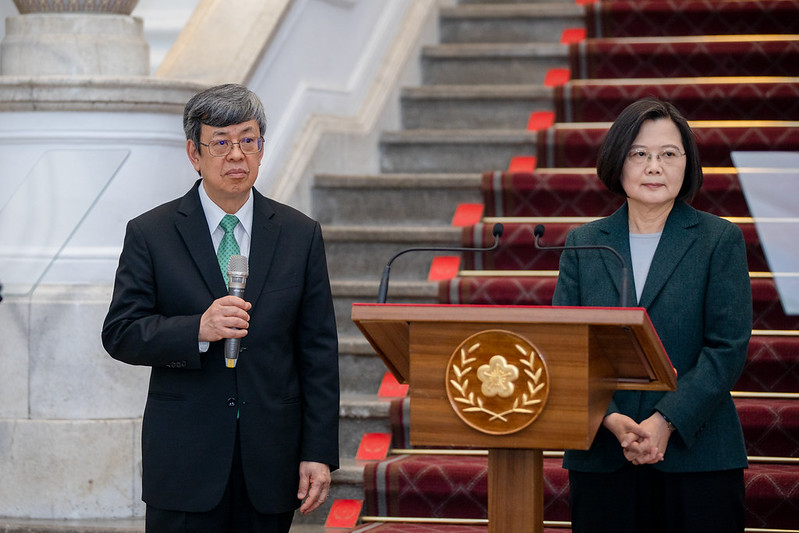News & activities
 News releases
News releases
On the afternoon of March 19, President Tsai Ing-wen, accompanied by Vice President Chen Chien-jen, issued remarks in the Entrance Hall of the Presidential Office Building regarding the outbreak of coronavirus disease 2019 (COVID-19). She stated that the next fourteen days will be crucial to the second stage of containing this virus and issued the following reminders to citizens: fully follow the regulations laid out by the Central Epidemic Command Center (CECC); refrain from hostility and mutual blame; and refrain from causing panic and help spread accurate information. The president also emphasized that our government has adopted proactive measures to maintain economic momentum, stimulate industry, and ensure financial stability, and will do everything we can to control the virus outbreak and protect our citizens.
A translation of the president's remarks follows:
Today marks two months since the first confirmed case of COVID-19 was announced in Taiwan. Over the past weeks, despite the lack of transparency regarding the outbreak abroad, we were able to ward off the first wave of imported infections, and our efforts received international praise.
The ability of the Taiwanese people to come together to fight COVID-19 and their commitment to protect Taiwan were crucial to our success in the first stage of preventing an outbreak.
However, over the past two weeks, we have seen the virus's rapid spread across the globe. Despite our proactive efforts, the second wave of imported infections has quickly come upon us. Thus, the CECC has implemented drastic measures, including comprehensively tightened border controls and greatly enhanced testing and containment measures.
The next fourteen days will be crucial to the second stage of containing this virus. We must be even more determined to face this challenge.
Here, I want to call on my fellow citizens:
First, I ask that everyone fully follow the regulations laid out by the CECC.
Indeed, many regulations put in place to stop the spread of COVID-19 may cause inconvenience, but I ask that everyone exercise patience. These regulations exist to help you protect yourself and our communities. All restrictions on individual movement are necessary short-term measures. At this time, taking care of your own health and the health of your family is the best way to protect our country. I also ask that everyone cooperate to reduce the burden on medical professionals.
Second, I ask that everyone refrain from hostility and mutual blame.
We should thank all citizens who are cooperating with home quarantine and health management measures, cooperating with CECC requirements, and establishing a line of defense for the health of all people.
We should also thank all of our epidemic prevention and medical professionals for working on the front lines day and night to keep Taiwan safe. At this time, we are all part of a collective entity, and we can only defeat this virus if we come together.
I also want to thank all the members of our national team working to manufacture goods to prevent the spread of COVID-19. They have all halted their regular work to fully commit themselves to producing these items, and their contribution exemplifies the resilience of the Taiwanese people under pressure.
Third, I ask that everyone refrain from causing panic and help spread accurate information.
Our government has ample supplies of all medical materials prepared. Allocations for our name-based face mask rationing system will also be gradually increased if necessary. The principle of border controls is to manage the unnecessary movement of people, but the movement of goods will remain open. We have sufficient stocks of daily necessities and we will ensure stable supply, so there is no need to panic buy or stockpile. Our government will harshly penalize anyone found to be stockpiling or driving prices up.
Next, I want to talk a bit about the economy. COVID-19's impact on the global economy and financial market continues to expand, and Taiwan will not be exempt from this. However, I ask that my fellow citizens rest assured that although Taiwan's economy will be impacted by the pandemic, our overall economic performance is still relatively stable compared to other countries.
In response to the impact of the pandemic, our government has adopted proactive measures to maintain economic momentum, stimulate industry, and ensure financial stability.
Emergency relief and economic stimulus measures include an NT$60 billion disease prevention special budget to accelerate implementation of industry relief measures. The government also has approximately NT$40 billion in existing budgets and funds that can be shifted to contingency measures. These two funding sources amount to a combined total of approximately NT$100 billion that can be directed toward our relief and economic stimulus program. We also do not rule out the possibility of further expanding expenditure as the need arises in an all-out effort to stabilize domestic industry and provide proper care for working people.
To address the needs of firms in the tourism and transportation sectors that have been adversely affected by the epidemic, particularly the relief and revitalization of the airline industry and related sectors, we will adopt a special program. In addition to nearly NT$20 billion from the special budget, we will also raise an additional NT$10 billion, for a total of NT$30 billion to help firms make it through this difficult time. This budget will also help the airline industry obtain more than NT$50 billion in financing.
In addition, we will allocate more than NT$30 billion from the Forward-looking Infrastructure Development Program to assist firms' transformation and long-term development.
As for the effort to strengthen economic momentum, I have called on the Executive Yuan to implement investments and procurements by the government and state-run enterprises as soon as possible. Budgetary allocations for investments in capital expenditures that can move ahead immediately this year amount to more than NT$870 billion.
We will also expand domestic demand by stepping up the pace of spending under our Forward-looking Infrastructure Development Program and other such programs, and will do our utmost to help accelerate private investment.
Cumulative planned investments from returning Taiwanese firms currently total more than NT$900 billion, and including those implemented beginning last year, NT$500 billion of these investments will be implemented by the end of this year.
I have also instructed the Executive Yuan to take stock of the possible impact of border control measures on business activity and investments, and they will effectively address these issues to ensure that business and investments can proceed smoothly.
In regard to ensuring financial stability, the recent hit to the Taiwan Stock Exchange has naturally caused market unease, but our economy actually has good fundamentals and strong liquidity. Our government has taken concrete steps to maintain foreign exchange market stability and stock market momentum. Our National Stabilization Fund is carefully monitoring international financial markets and is ready to respond quickly as the need arises.
All our resources are at the ready, and our government will convene meetings with senior economic and financial officials whenever necessary to address quickly evolving international conditions.
I am aware that observers are concerned about the legal basis of the emergency measures we are taking to address the pandemic. The legal basis needed by the government in the course of its response to this pandemic have been properly provided by the Communicable Disease Control Act as amended in the wake of the SARS epidemic, and the special legislation our Legislative Yuan has quickly enacted in response to the current pandemic.
For the current COVID-19 situation, our legal and policy tools are sufficient. If future changes in conditions have a greater impact on the economy and society, we will take further action as necessary, and make decisions about carrying out swift legal amendments or issuing emergency orders based on actual needs.
COVID-19 is now a global pandemic, endangering health and the economy. In addition to protecting ourselves, Taiwan must also think of others. The only way for Taiwan to get through this pandemic is to work together with the international community to successfully prevent its spread.
Yesterday, our Ministry of Foreign Affairs and the American Institute in Taiwan issued a Taiwan-U.S. Joint Statement on a Partnership against Coronavirus, strengthening bilateral cooperation in joint R&D for rapid tests, vaccines, and medicines. We will also exchange medical knowledge, and supplies and equipment required for disease prevention. Academia Sinica and the European Union have also held in-depth discussions about cooperating to develop preventive and quarantine technology, as well as vaccines.
In fact, many countries have expressed a willingness to cooperate with Taiwan to combat the spread of COVID-19. I have already asked Vice President Chen to take responsibility for selflessly sharing our epidemic control experience with the world in the spirit of openness and mutual assistance. This is Taiwan's international responsibility. Full international cooperation is the only way to ensure that the international community can win this battle. The so-called "using the pandemic to pursue independence" idea reflects the narrowmindedness of some people who think only of politics, and does nothing to help prevention efforts.
The WHO's inability to fully play its role and lead global prevention efforts has led to global spread of the pandemic. The international community is on high-alert and better understands the necessity of cooperation. So here, I am calling on countries around the world to accelerate cooperation. Taiwan is willing to contribute our epidemic response capabilities so that together, we can care for the health of all humankind. We are putting the goal of "Taiwan can help" into practice.
Amidst the current pandemic, the world has seen the tremendous strength and resilience of Taiwanese people. Our experience in handling past crises has given us the ability to deal with current challenges. So despite the difficulties, by overcoming this challenge Taiwan will become stronger.
Our country deserves our confidence. We will do everything we can to control the COVID-19 outbreak and protect our citizens.
